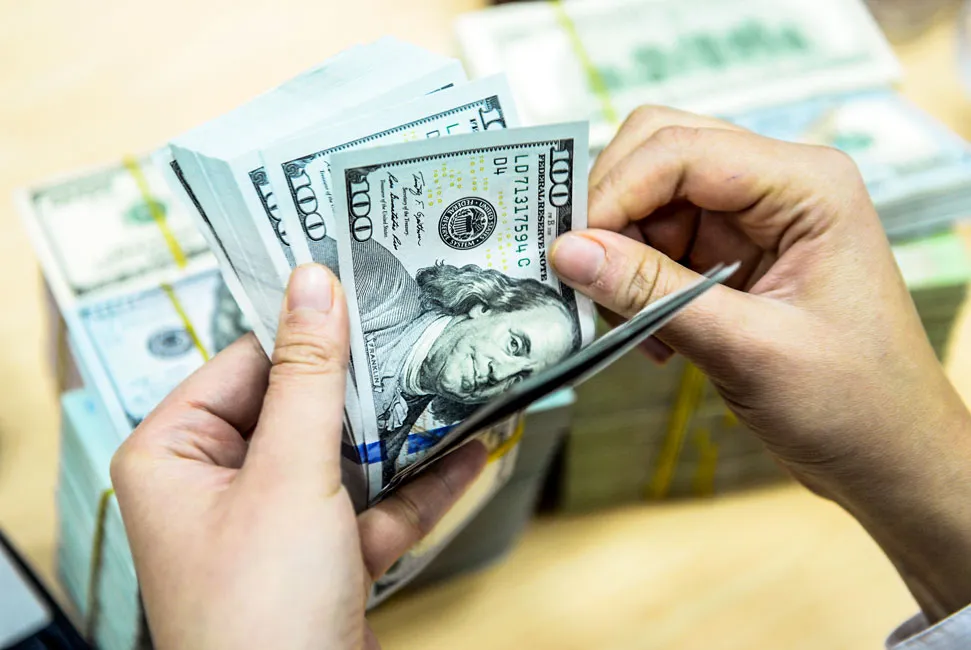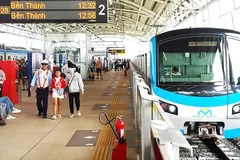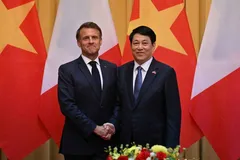Luckily Vietnam did not exceed the third criteria of persistent and one-sided intervention in foreign exchange market which happens when the net purchases of foreign currency are conducted repeatedly and total at least two percent of GDP over a 12-month period.
Hence, Vietnam now is fortunately only on the currency monitoring list of US, alongside eight other countries, and not yet determined as a currency manipulator.
VND not volatile in recent years
Hence, Vietnam now is fortunately only on the currency monitoring list of US, alongside eight other countries, and not yet determined as a currency manipulator.
VND not volatile in recent years
The bilateral trade surplus between Vietnam and US was at USD 40bn, ranking sixth on list of US trade partners. The current account, after long time of deficit, now shows surplus of about 5% of GDP. This surplus was driven by increasing exports of FDI companies, not domestic enterprises.
| If there is no rational reason, the country is likely to be listed as a currency manipulator. The case where foreign reserves increase without a foreign investment inflow is an example. |
The State Bank says that it manages a flexible exchange rate. However, in the real market, VND is linked more strictly to USD than other currencies in the basket of reference currencies.
According to the IMF, VND has not been very much volatile in recent years. Sometimes, VND has appreciated. However, it also depreciated at other times. In 2017, VND was trading 7% below its fair value, while in 2018 the currency was valued higher than some base currencies.
The State Bank of Vietnam does not inform officially its interventions in the foreign exchange market. However, the number of net bought foreign exchange that US got, which is 1.7% of GDP, is considered reliable. Vietnam foreign reserve was USD 58bn at end of 2018, equivalent to 80% of IMF accepted level which is determined by at least three months of imports.
Vietnam’s intervention in the foreign exchange market was assessed to be quite balancing. In the first half of 2016, when the financial market was favorable, the State Bank net purchased foreign currencies, while it net sold in the second half of the year to control depreciation of VND.
According to the US government, the interventions of the State Bank of Vietnam were just to balance the movement of exchange rate, rather than manipulate the domestic currency to gain export advantages.
After doing a deep analysis, US gave Vietnam some suggestions. Firstly, Vietnam should strongly restructure its economy to make it more flexible, stable and dynamic. Secondly, modernizing the framework to manage money policies will allow Vietnam to govern the money market by targeting inflation rate. Thirdly, Vietnam should constrain its credit growth. Fourthly, the State Bank should make their intervention rules stronger to mitigate vulnerability of banking and financial markets. Notably, Vietnam is the only country, out of nine countries, that US suggested to use macro cautious policies.
Currency undervaluation through foreign reserves
Currency undervaluation through foreign reserves
The report by the US government seems to allow a very small room for Vietnam’s macro policies. According to the US, when the foreign reserves approach an acceptable level, interventions in foreign exchange market should be reduced gradually, and the movement of exchange rate should reflect the long term fundamentals of the economy.
| Most countries understand that Donald Trump’s government just uses currency manipulation as a trick in diplomatic and economic activities. |
However, the question is what is an acceptable level? The traditional rule of thumb of three months of imports is widely used to assess the adequacy of foreign reserves. Vietnam is nearly at this level. However, if we compare Vietnam to other 21 countries on the US report, many countries’ reserves are exceeding this threshold. Vietnam’s foreign reserves ranked at number 15, lowest on the list of US trade parties, excluding six countries of EU which are France, Germany, Holland, Italy, Belgium and Ireland.
US thinks that the Central Bank of EU, ECB, has been allowing Euro to remain afloat and has not intervened in the foreign exchange market since 2001. The other countries, including Switzerland, China, Japan and Brazil, have foreign reserves of 15-23 months of imports. While some countries in ASEAN like Singapore, Thailand, Malaysia have foreign reserves of 6-8 months of imports. So, based on the size of GDP, Vietnam has potential to increase its foreign reserves.
To understand this point precisely, we should focus on the methodology of US analysis. Why US cares more about the foreign reserves of a country?
 Illustrative photo.
Illustrative photo. Practically speaking, the thing that US really cares about is whether a country is depreciating its currency, to gain trade advantages, not the level of foreign reserves. However, how to know whether a country is depreciating its currency or not? It will be not difficult to determine if a country publishes its exchange rate data and its intervention in the foreign exchange market. However, so far less countries on the list of 21 US trade parties are transparent in these activities, hence, only choice for US is to look into foreign reserves (combined with other information through diplomatic activities) and then determine if a country is depreciating its currency or not.
US has adjusted the threshold of foreign reserves from 8-12 months previously to 6-12 months currently to determine the intervention level. It means that the size and the frequency used to determine the currency intervention has not eased. Some intervention actions which are not exceeding 2% of GDP are still monitored strictly. Accordingly, if there is no rational reason, the country is likely to be listed as a currency manipulator. The case where foreign reserves increase without a foreign investment inflow is an example.
The cost of increasing foreign reserves is from higher interest rate of treasury bills which are issued to balance the VND amount being pumped to buy USD (other costs are not mentioned in this article). However, with a current very low level of foreign reserve, Vietnam’s economy is more vulnerable and sensitive to outside shocks. It causes higher marginal cost for adding 1 USD more to foreign reserves.
A study of BIS in 2016 found that the reason for State Banks of many emerging countries to increase their foreign exchange reserves is to mitigate the impact of the investment outflow on their foreign exchange rates and financial systems.
Stabilizing the financial system and helping to build investors trust are the two biggest benefits of foreign reserves. This also makes the explanation of Deputy Governor of the State Bank, Nguyen Thi Hong, much clearer. The money policies are to stabilize the macro economic and foreign exchange market and care less on cost of foreign reserves.
Based on these benefits of foreign reserves, should the State Bank of Vietnam share with US and IMF some of its secrets to get higher foreign exchange reserves? It is not a bad deal if Vietnam can exchange small information for several billions of USD foreign exchange reserves.
Currency manipulation
Currency manipulation
The above analysis only mentions the economic ability of the State Bank. Currency manipulation is a complicated issue with many calculations which even exceed US expectations. However, most countries understand that Donald Trump’s government just uses currency manipulation as a trick in diplomatic and economic activities. USA is ready to adjust these three thresholds if their benefit is affected.
Although Vietnam is successful in qualifying for all changeable criteria of US in managing currency policies, the winner will always be US. We agree that the first two thresholds exceeded as is the nature of the economy. However, it is wrong to think that it is hard to change the trade surplus and current account trend in the short term just because exceeding these two thresholds are the trade structure and economic nature. It is even more wrong to conclude that Vietnam should be flexible and sophisticated in managing its currency polices in the short term.
It is not hard for US to find an excuse from the interventions in currency and foreign exchange market. Vietnam may be at risk to be on list of currency manipulators in next reports, including report in this October. We need a powerful voice to take Vietnam out of the monitoring list of currency manipulators.




















